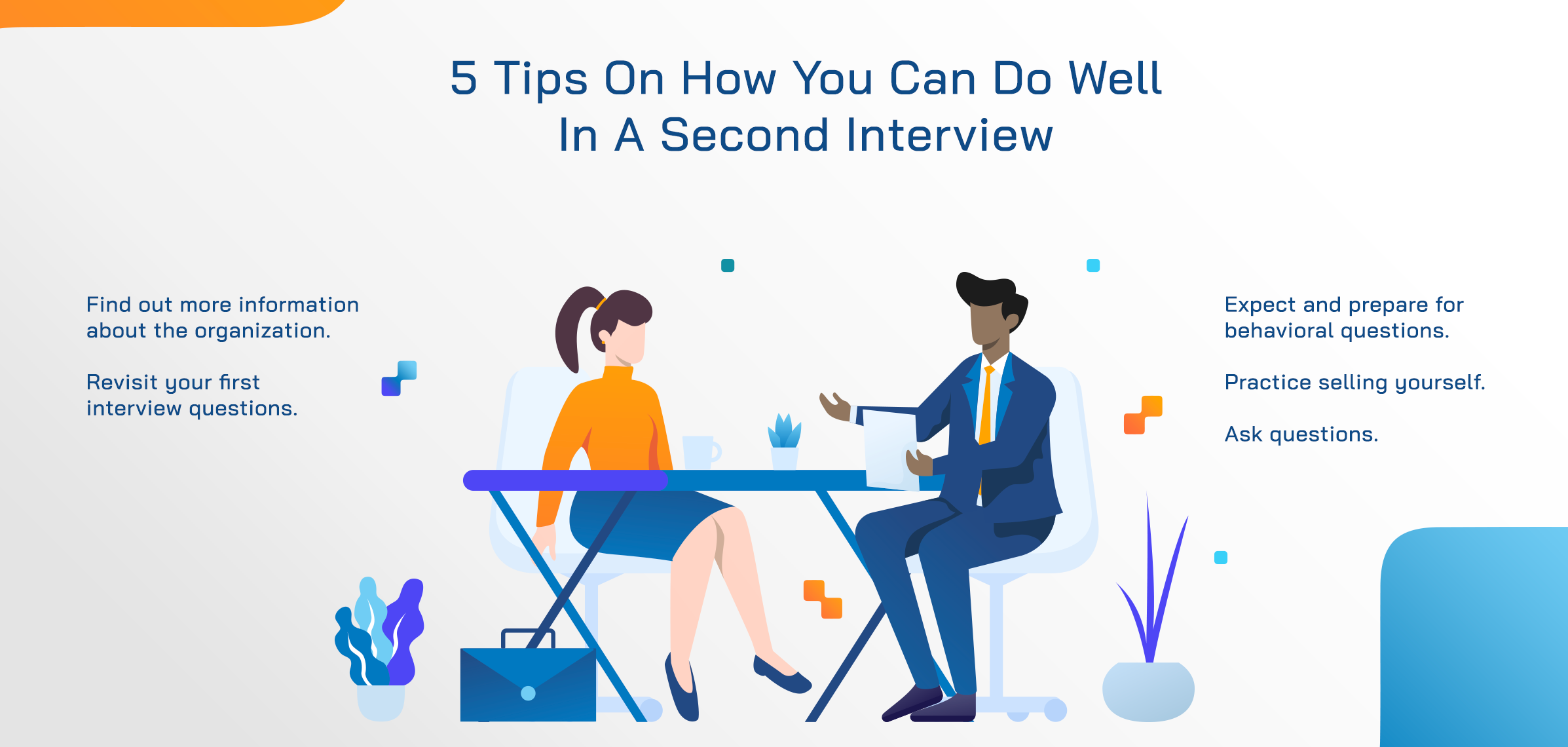
Let’s say you applied for a job, got called up for an interview, and aced it right off the bat. After some days, you received a callback from the hiring manager, and this time, he’s asking if you’re available for a second interview. Is this good news? Did you get the job? Yes, and No. It’s great news, but it doesn’t mean you have the job. So what exactly does a second interview mean?
What Does A Second Interview Mean?
It means that you meet the basic job needs, and the hiring manager believes you can be a good fit. Sometimes, a second interview is the final stage of the interviewing process, and other times it isn’t. All organizations have policies regarding their interviewing process, and sometimes these policies means having multiple interviews before selecting the final candidate.
Getting another interview depends on the job role. For instance, applying for an IT C-suite role means your interview process will be lengthy. Or, if you’re applying to a tech role like software development that requires you to prove your skills, a second interview might be necessary for a test to show that you’re up for the task.
Why Is The Second Interview Important?
It helps to provide more in-depth knowledge of your experience and skills relevant to the job. It also helps the interviewer access and better understand your personality and what it’ll be like working with you. So, you should expect more specific and behavior-based interview questions.
During a second interview, you might get interviewed by a panel. Here, you may meet more core members of the organization, including your prospective head, manager, top colleagues from your potential department, and the hiring manager. Their goal is to get more information about you from different perspectives to see if you’ll fit well with the company and its culture.
This interview also helps you to cross-check the job opportunity. Yes, you’ve already shown that you have the right experience and skill set, but the second interview serves as a platform to know if you want the job. So make sure to use the opportunity to ask questions to determine if the job is right for you.
Frequently Asked Questions
What are some questions to ask in a second interview?
When the question table turns to you, make sure you have at least 3-5 relevant and thoughtful questions you can ask. These questions should cover all the necessary aspects of the job, the responsibilities and expectations, the people, their culture, and the company itself. Some great questions to ask include:
- What’s the next step for the interview process?
- Is there an employee performance review process?
- Is there an orientation process for new hires?
- Is there a chance for professional growth with the company?
- How is the department structured?
- What are the daily duties and responsibilities for this position?
- What are the company’s expectations for this position?
- What is a typical workday like at the office?
- What are the challenges you’ve faced in the job?
Asking questions is a brilliant move to show that you’re willing to go the extra mile to get that information that’ll help you perform the job well. Based on psychology, asking questions proves to the hiring manager that you’re interested in investing more time to know the ins and outs of everything the job entails. Hence, they would be eager to give you an offer.
What are the chances of getting a job after the second interview?
The chances of getting a job after the second interview are 50%. Some even say 1 out of 4. Nonetheless, some signs let you know if you got the job after the interview. For example:
- The tone of the conversation becomes casual.
- You’ll hear more of the word when instead of if.
- You’ll get introduced to other core members.
- There’s a discussion around your salary and perks.
- They’ll start the follow-up and the onboarding process.
Who conducts the second interview?
The people who conduct the second interview may vary depending on the job role and the organizational structure. Nonetheless, the hiring manager is the sole convener. If it’s going to be a panel interview, you should expect the C-suite representative, the head of the department you are applying to, and other top colleagues at the firm that you might likely work alongside.
What are the different types of second interviews?
A second interview isn’t always the regular one-on-one type of interview. There are three core interview types you’ll most likely face:
- One-on-one interview – Involving only you and the hiring manager
- Panel interview – Involving core members of the organization. Most often, the higher executive and departmental heads.
- Group interview -Involving two or more interviewee
For a second interview, the panel interview is the most common type. So come prepared.
5 Tips On How You Can Do Well In A Second Interview
You might have gotten lucky with the first interview, but performing brilliantly in the second interview, you’ll need two more things besides luck – Preparation and Practice. Here are some tips that can help you out.

Find Out More Information About the Organization.
Learn more about the organization through its website and social media pages to understand its brand, culture, mission, and vision. Check out their achievements, as well as their previous, current, and upcoming events.
Impressing new people is also a must, so look into the LinkedIn pages of the hiring manager you met during the first interview, the potential C-suite holders, and the head of the department of that job role. These are the people that’ll likely be on the panelist. Usually, employers get impressed when a candidate knows a lot about them, and doing this will help you connect better with them during the one-on-one or panel interview.
Revisit your First Interview Questions.
There’s a high probability the questions from your first interview are going to reappear. This question repetition happens because, most times, it’s a different staff that’ll be conducting the interview.
Other times, the hiring manager might only want to clarify your answer. So, make sure to practice those questions and have a detailed and concise response to give them. While answering those questions, be honest. Don’t be a robot and cramp all the answers.
Expect and Prepare for Behavioral Questions.
Behavioral questions help the interviewer know how well you’ve performed in your past job roles. This helps them assess how you’ll perform for the one you’re applying to. They also help to access your competencies, ethics, and values and how they fit with the company culture. I’m talking about questions like “tell me about a time when you” or “How did you”. These questions revolve around the moments you were struggling and the steps you took to succeed. .
Most times, these questions need real-world situation examples. So, have two to three situations and prepare your answer by giving specific details regarding the scenario and relevant skills you adopted. Employers want to know how well you can handle yourself during difficult work situations. They also want to check how well you can communicate and adapt to changes.
Practice Selling Yourself.
At this point, you have to sell yourself more because this is where the actual competition begins. Pitch ideas that you can have to help the organization grow and make your responses align with the organization’s goal, mission, and vision.
Also, don’t be arrogant. You wouldn’t want to step in anyone’s shoes or act in a way that’s too forward. You only need to show them you can bring something to the table when you’re in the position.
Ask Questions.
Asking questions is an opportunity for you to check out the company and determine if they’re right for you. It’s also your best chance to get a sense of the daily responsibilities, priorities of the job, and goals.
Make sure to have a list – about 3-5 relevant and thoughtful questions ready for this phase. More so, make sure to ask what impact your role has on the company’s success. Asking questions of this nature shows the interviewer that you have a genuine interest in the position and company.
Never bring up salary and benefits at this stage—the chance for that will come up later during the offer stage. Also, don’t ask questions about promotions or vacations or anything about the organization you can find on a google search. Before you end the interview, don’t forget to ask for the timeline to make the final decision, so you can know when to expect feedback.
To sum up,
Your second interview shouldn’t cause you to be anxious. It’s actually a good sign that you’re getting considered. You only need to adapt, practice, and prepare well for it. Research about the organizations and the core people you’ll likely meet, practice your first interview questions and know-how to answer the behavioral and situational questions.
Sell yourself to be the best fit, ask relevant and thoughtful questions, and don’t forget to follow back with a thank you email. Keep in mind that you must not slack off with your dressing – so, dress well before the interview. Don’t forget to breathe and think before you respond to a question! Be honest and be respectful.
You don’t have to do it alone. Eleven Recruiting can support you land your next job offer. Let us help you find what’s right for you
Good luck!

